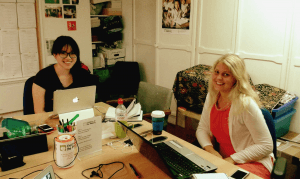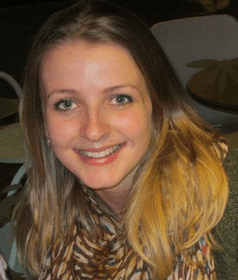Green Shoots Link-Up
By UCL Careers, on 1 February 2017
As part of Charities and NGOs themed week, we have asked one of the London-based charities attending the Link-Up event to introduce themselves to you in advance.
Muneezay Jaffery tells us about her charity Green Shoots Foundation and the internship opportunities available to UCL students. (The photo shows two interns in the Green Shoots Office in Lavender Hill.)
Please tell us about your charity
Green Shoots Foundation is a small charity set up in 2010, by Jean-Marc Debricon, who aimed to make use of his finance and banking background for more worthwhile and long-term projects. In the past seven years, our small team has established three main programs in seven countries. Our work pertains to skills training, be it medical for HIV treatment in Myanmar, Vietnam and Kyrgyzstan or agriculture skills in Cambodia and the Philippines. We also facilitate educational loans for social entrepreneurship in India.
Green Shoots started out with a microfinance focus but very quickly developed into adopting a skills-based approach. We believe investing in people and, then making loans, improves livelihood opportunities and brings about sustainable transformations. For example, our work in Cambodia for the past three years has focused on updating and bringing sustainable agriculture skills to government run schools in rural areas. Now, as we transition to the next stage, we are taking an enterprise approach and will focus on the cultivation of agri-business ideas. In all our countries of operation we work with trusted local partners rolling out projects on the ground.
What activities have previous UCL interns been involved in whilst volunteering at Green Shoots and what can an intern expect when they first start?
UCL interns have been instrumental in helping us with fundraising in the UK. This can involve everything from managing the database of trusts and foundations, to writing grant applications and researching new opportunities. With a recent intern, we have diversified our fundraising strategy to include the approach of “twining” with local schools. This has proven to be successful as we approach local primary schools to buddy up with schools in Cambodia, exchange letters and photographs but also fundraise with us throughout the year.
How have interns developed their employability whilst they have been working with you?
By working in fundraising candidates, especially those interested in Global Development or charity sector careers, learn the basics of grant writing- what makes a good application and how to structure proposals. Transferable skills such as time keeping, being organised, and writing formal correspondence are also ways interns have developed their employability. Our office environment is quite friendly and laidback. As we share it with another charity, interns are able to participate in team meetings and contribute towards day-to-day running. Whilst at Green Shoots they also get the opportunity to attend relevant training events, panel discussions and make use of networking opportunities.
What advice would you give to UCL students and graduates who may be looking to set up a charity or similar organisation?
Although it might seem out-dated, when it comes to setting up a charity or deciding on a project, thinking in terms of Theory of Change and working backwards is a good way to start. By this I mean, knowing the impact you want to make and then figuring out how to go about it. This approach also helps tremendously with decision making for activities, setting realistic and achievable goals and constantly thinking about how to measure and report them.
Being transparent and accountable towards the individuals we work with and to donors we raise funds from should be the first rule for being involved in the charity sector and I always find fundraising is a good way to understand that relationship.
Find out more:
http://www.greenshootsfoundation.org/
The Green Shoots Foundation will have a stand at the Charities and NGOs Link Up event this Thursday alongside other organisations including Oxfam, The Children’s Trust, The Challenge, Ark Teacher Training, CharityWorks, Unlocked Graduates, UCL VSU, Sustrans, UCL Amnesty International Society
*Sign up to attend this event via your My UCL Careers account
 Close
Close








